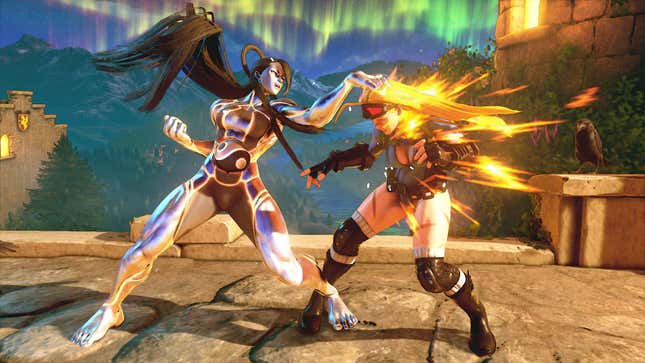
The latest Street Fighter V patch finally addresses one of the game’s most prevalent problems: shoddy online multiplayer. It took constant prodding from fans and a recent third-party fix to finally get these changes, four years after the game’s release.
Street Fighter V is a game with problems, the most notable of which prevents users from experiencing any sort of meaningful online play without hiccups, stutters, and generally laggy matches. Although the game utilizes ‘rollback’ netcode—a superior technology for the high execution requirements normally associated with fighting games—it does so in a way that completely negates all of its advantages. This has been a constant problem for folks since Street Fighter V launched in 2016, despite several patches and fixes.
As the fighting game community is wont to do, players eventually took matters into their own hands. Last month, a Reddit user named Altimor released their own fix for the Street Fighter V netcode. Altimor claimed that it took them only a couple of days to reverse-engineer Capcom’s code, diagnose the problem, and develop the patch. They also confirmed that the specific netcode issues notable members of the community had pointed out shortly after Street Fighter V’s launch were indeed the cause, proving just how long this had been a problem.
“My patch causes your game to momentarily slow down if your opponent’s game falls behind, keeping you in sync and preventing unnecessarily large rollbacks,” Altimor told Kotaku via private message shortly after releasing their fix. “I both want to help out the Street Fighter community and hopefully get Capcom to release an official fix. However, since we’re likely nearing the end of Street Fighter V’s life cycle, an official fix may be unlikely.”
Altimor’s fix wasn’t without its issues. It caused a rift between Street Fighter V players on PlayStation 4 and PC because it could only be utilized on the latter, so much so that PC users eventually shielded themselves from PlayStation 4 opponents to avoid bad connections. The patch also couldn’t correct the underlying issues with Capcom’s proprietary netcode, only make matches a little better when players eventually got desynced. That said, it alleviated the issue enough that the community saw a surge of interest in Street Fighter V online multiplayer despite worries that Capcom might ban players with the fix or make it impossible to use in the future.
For a long time, that didn’t happen. The third-party patch survived regular server maintenance by the developers, and eventually caught the attention of Capcom executive and fighting game producer Yoshinori Ono. He replied to several fans who expressed their concerns with the netcode on Twitter throughout January and, soon after, officially announced that Capcom would be looking into the situation with the upcoming release of Street Fighter V: Champion Edition. Ono never mentioned Altimor’s work directly, but it no doubt played some part in getting the company to respond after years of silence on the matter.
Street Fighter V: Champion Edition launched on February 14 with no apparent improvements to online play. Earlier this week, Capcom dropped an official patch that, at first, appeared to fulfill the community’s worst nightmares by disabling Altimor’s fix. Social media ignited with condemnations for Capcom, four years of frustration bubbling over into a righteous fury. But when the servers came back online and folks had a chance to spend time with the updated game, they found netplay to be pretty good compared to its previous incarnation. It isn’t perfect and doesn’t fix any underlying issues with the netcode but, like Altimor’s patch, it does enough to hide the crappier aspects and make the multiplayer serviceable.
That said, it still took Capcom four years to get to this point. Street Fighter V has been a mess since 2016, every couple of steps forward met with another step back. The game’s online play will never be great until the developers address the fundamental issues with their netcode. And with the Olympics-adjacent Intel World Open relying entirely on online qualifiers, it’s mind-boggling why more resources haven’t been invested into making multiplayer as tight and accessible as possible.